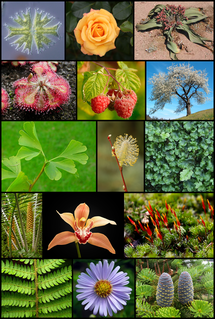Pepper or peppers may refer to:

Camera obscura, also referred to as pinhole image, is the natural optical phenomenon that occurs when an image of a scene at the other side of a screen is projected through a small hole in that screen as a reversed and inverted image on a surface opposite to the opening. The surroundings of the projected image have to be relatively dark for the image to be clear, so many historical camera obscura experiments were performed in dark rooms.

Allspice, also called pimento, Jamaica pimento, Jamaica pepper, pimenta, or myrtle pepper, is the dried unripe fruit of Pimenta dioica, a midcanopy tree native to the Greater Antilles, southern Mexico, and Central America, now cultivated in many warm parts of the world. The name "allspice" was coined as early as 1621 by the English, who thought it combined the flavour of cinnamon, nutmeg and cloves.

Malagueta pepper, a variety of Capsicum frutescens, is a type of chili pepper widely used in Brazil, the Caribbean, Portugal, Mozambique, Angola, and São Tomé and Príncipe. It is heavily used in the Bahia state of Brazil. It apparently got its name from the unrelated melegueta pepper from West Africa, because of a similar level of piquancy.

Eugenia is a genus of flowering plants in the myrtle family Myrtaceae. It has a worldwide, although highly uneven, distribution in tropical and subtropical regions. The bulk of the approximately 1,100 species occur in the New World tropics, especially in the northern Andes, the Caribbean, and the Atlantic Forest of eastern Brazil. Other centers of diversity include New Caledonia and Madagascar.

Pimenta racemosa is a species of plant in the myrtle family (Myrtaceae) that is native to the Caribbean region. Common names include West Indian bay tree, bay rum tree, and ciliment. It is used in cooking and an essential oil is distilled to produce a fragrant cologne called bay rum; although bay rum is primarily rum, the concentrated essential oil is toxic and renders the product undrinkable. The tree is 4–12 m tall and the white flowers, about 10 mm wide, become black, oval fruits measuring 7–12 mm. The plants are now grown widely in other tropical areas, including Oceania. The ideal conditions for P. racemosa are regular irrigation and bright sunshine.

Pimenta is a genus of flowering plants in the myrtle family, Myrtaceae described as a genus in 1821. It is native to Central and South America, Mexico, and the West Indies.

The dark long-tongued bat is a bat species from South and Central America. It is monotypic within the genus Lichonycteris.

Crossodactylus is a genus of frogs in the Hylodidae family. The genus occurs in Brazil, southern Paraguay, and northern Argentina. These frogs are sometimes known as the spinythumb frogs. They typically inhabit streams in mountainous areas in the Atlantic Forest or in montane savanna.
The dusky spiny tree rat is a species of rodent in the family Echimyidae. It is endemic to Brazil.
Pimenta cainitoides is a species of plant in the Myrtaceae family. It is endemic to Cuba. It is threatened by habitat loss.
Pimenta haitiensis is a species of plant in the Myrtaceae family. It is endemic to the Dominican Republic.
Pimenta jamaicensis is a species of plant in the Myrtaceae family. It is endemic to Jamaica.
Pimenta odiolens is a species of plant in the Myrtaceae family. It is endemic to Cuba. It is threatened by habitat loss.
Brookula is a genus of minute sea snails or micromolluscs, marine gastropod molluscs unassigned in the superfamily Seguenzioidea.

Ipomoea obscura, the obscure morning glory or small white morning glory, is a species of the genus Ipomoea. It is native to parts of Africa, Asia, and certain Pacific Islands, and it is present in other areas as an introduced species
Fernando Ismael Fernandes PimentaGOIH ComM is a Portuguese sprint canoeist who has won medals at the Olympic Games, World and European championships.
The grizzled Mexican small-eared shrew is a small mammal in the order Eulipotyphla. It is native in Mexican highlands. It can be found in dense, wet cloud forest, where it is found in the thick herbaceous undergrowth and leaf litter. It is known to be insectivorous and terrestrial. Threats to the species are deforestation for agriculture and urban development.
Fusceulima is a genus of sea snails, marine gastropod mollusks in the family Eulimidae.
Allantocystis dasyhelei is a gregarine parasite of the larval biting midge Dasyhelea obscura. It is the only species in the genus Allantocystis, as well as the family Allantocystidae.












